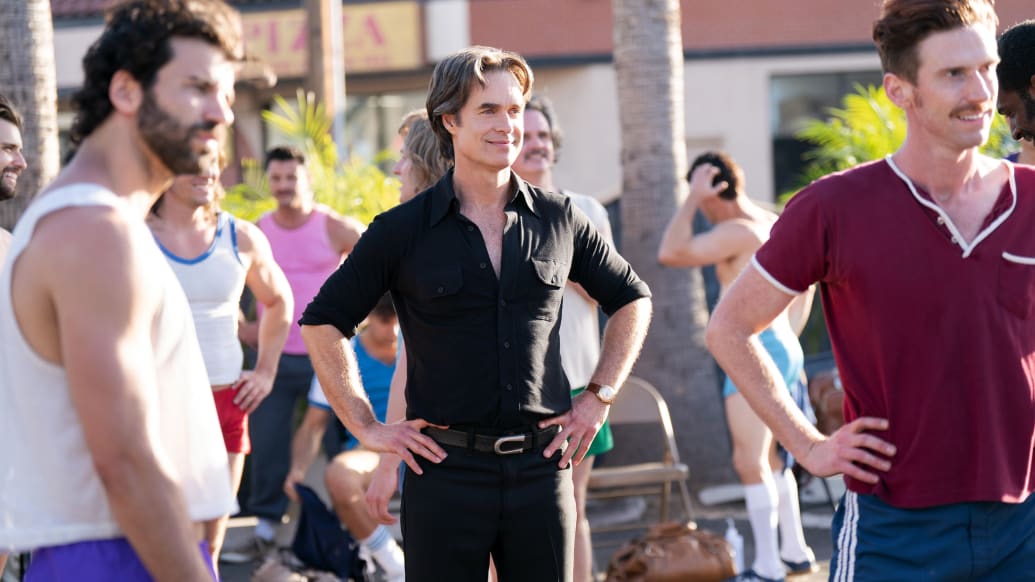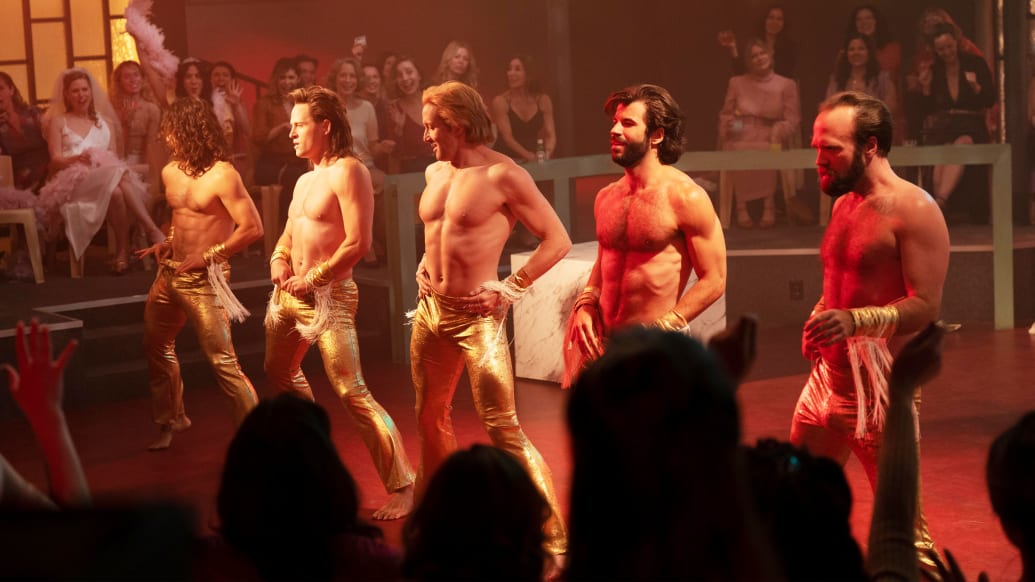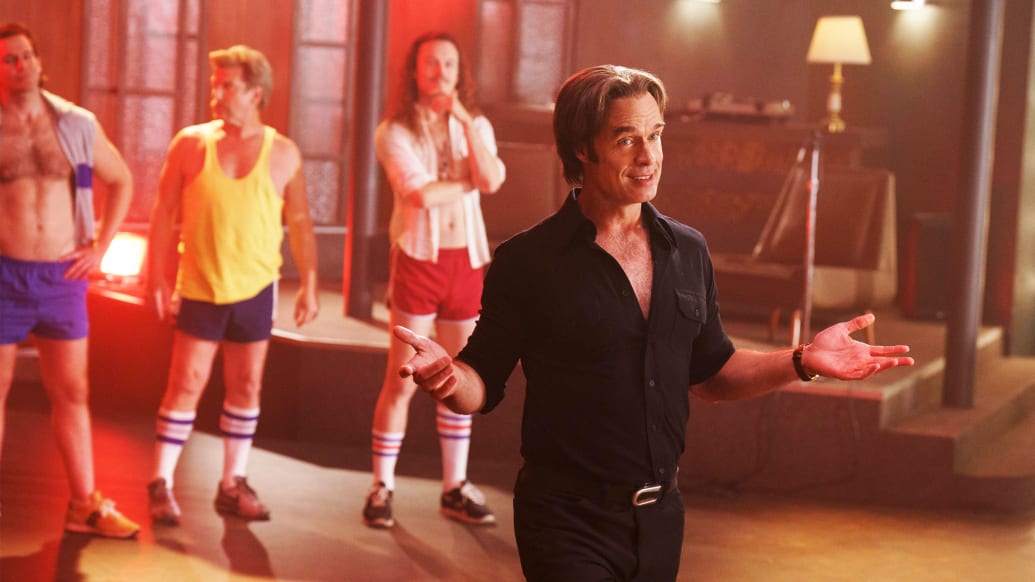There is so much going on in follows the unlikely founding and cannon-shot popularity of the Chippendales dancers in the late ’70s into the ’80s—a more inspiring and, ultimately, seedier story than most people are aware.
Somen “Steve” Banerjee (Kumail Nanjiani) was an immigrant who saved his money working at a franchise convenience store to buy his own club. After faltering with his first attempts at a successful theme, he lands on the idea of male exotic dancers by chance—realizing its financial potential after his business partners take him out one night to a bar with go-go dancers.
The finishing, golden touches (dancers wearing nothing but bowties, cuffs, and breakaway pants; high-concept, athletic routines; flowing booze) fall into place when his group of key collaborators assemble. That includes a costume designer played by Juliette Lewis, an accountant-turned-paramour played by Annaleigh Ashford, and the talented, egotistical, and desperate choreographer Nick De Noia, Bartlett’s character.
There’s an undeniable sexiness to Welcome to Chippendales. Nick’s swashbuckling charm and craven appetite for partying, as he explores life as a gay man following a divorce, is key to that. There’s also a winking cheekiness befitting a show about cheesy male strippers, spotlighted by the natural glint that Bartlett, a native Australian, has in his eye. But there’s also a sense of doom as dreams morph into delusion and ambition devolves into greed. (Google what happens to these real-life people at the peril of your enjoyment of the series.)
Nick is a brilliant tragicomic character. He’s a talented choreographer who takes his work seriously, as we see when he holds auditions to cast the Chippendales or stages elaborate production numbers that would seemingly be out of place at a silly strip show—a Rocky Horror-inspired rock opera, for one. He’s also somewhat of a pathetic narcissist, treating his two Emmy Awards (for choreographing a children’s show about unicorns) as if one is a Nobel Peace Prize and the other an Olympic gold medal that should give him access to all the success he thinks he deserves.
When we chat with Bartlett, it’s a few days after he won his own Emmy Award, after his first nomination, for playing the tortured hotel manager Armond on The White Lotus. He had already filmed Welcome to Chippendales by the time he was on stage thanking White, his co-stars, and his partner, Matt. Did holding the trophy give him any new insight into how Nick might have felt about his awards?
“That’s a fascinating thing that I haven’t thought of,” he says. “Maybe because of the age that I am, I have that kind of stuff in a different perspective than maybe Nick did. I’ve had a long career without a lot of awards.” He lets out a massive laugh.
“I fully loved that moment and I’m really enjoying the period that I’m in right now,” he says. “But it’s never been the endgame for me, whereas I feel like it was for Nick. He was very fiercely ambitious. I am ambitious. There are things that I really want to do, and there have been things that I’ve wanted to do as I’ve moved through my career. But I’ve also wanted to be happy in life and have great friends and good relationships.”
He laughs again: “Not that I’ve always managed to do that.”
Bartlett excels at radiating a menacing energy that is tamed by a palpable warmth. His characters are intense, tightly wound coils of stress and ambition. But there’s an instant familiarity to them, too. He’s like a human powder keg, but when it goes off, you don’t know if it’s going to be with violent explosions or friendly hugs.
That certainly was true of Armond, whose inability to control his exasperation, in spite of his best intentions, was his Achilles heel. Bartlett’s magnetic fitness guru Vinnie Green on Physical also fits that bill. Nick in Chippendales is someone who seems to have the tools to achieve what he wants in his life, but whose sense of entitlement, aggression, and self-destructive nature has him crashing through every wall of opportunity.

Before starring in the series, Bartlett had never been to a Chippendales show. When he first moved to New York in the early 2000s, he worked in nightlife at an East Village club that employed a cast of burlesque dancers. So he’s familiar with what it’s like to be in the room with that kind of performance and witness what it does to the energy of a crowd. Now, though, he’s been so intertwined with the true-crime elements of Welcome to Chippendales that, if he attended one of their shows, “I’d be thinking: They’re smiling now, but what’s behind those oiled muscles and smiley faces?”
He’s not sure what it is that, at age 51, he’s been cast in back-to-back roles that center around—and require him to—dance, with this and Physical. The body rolls, gyrations, and hip thrusts are all things that he says didn’t come naturally to him—to the point that he swears the show’s choreographer tailored the moves to his rudimentary skill level. Asked if, now that he’s been taught to perfect them, he’s shown them off at a party—or perhaps behind closed doors—he blushes. “I don’t know that I should reveal that!”
“They feel to me like such tongue-in-cheek moves,” he says. “They also were in the Chippendales, but I guess it was super sexy when those guys did. I think if I did it, people would just laugh. I feel like it might come off like a SNL skit.”
The physicality in Chippendales isn’t limited to the club’s dance floor. The party atmosphere of the ’80s is a crucial backdrop to the series, and Nick’s sexual appetite is explored, similarly, as a key window into what drives him.
There is oral sex with a guy in a bathroom, and a steamy tryst with a man picked up while on a coke binge. It’s a continuation of a remarkable aspect of Bartlett’s career, and something that shouldn’t be overlooked because sex is often dismissed as titillation. It’s not just the famous rimming scene in The White Lotus. It’s also meaningful, realistic scenes in Tales of the City, Looking, and, now, Welcome to Chippendales.
Barlett, who came out as gay early in his career, isn’t just playing gay characters on screen. He’s playing gay characters who also have sex—and the audience sees that sex happen. Even in 2022, that still seems transgressive.

“I think you’re right,” he says. “When you get the chance to play a character that’s part of a community that’s underrepresented in the media—fortunately, there are more queer characters in the media these days—it always feels like a responsibility. ‘How can I really bring authenticity and humanity to this character in a way that might be illuminating for people who don’t have any queer people in their life?’ I think showing intimacy between queer characters is something that is still a little unfamiliar to some people. And it’s a universal thing to be able to show intimacy between characters.”
Before I can even ask the question, he explains why this—and why all these characters he’s played at this pinnacle in his career—matters: “Any connection points that we can make in these times when we’re very divided… It’s a beautiful thing.”





